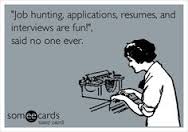Social media may be a two-edged sword to older job applicants without current employment or people who are attempting a career transition later in life. Today’s job-hunters won’t get far without access to digital job applications, online job postings, and email for correspondence.
Lopez-Kidwell, Grosser, Dineen, and Borgatti approached job searches within job search goal life spans with two empirical studies focusing on “social comparison theory, control theory, and the attentional focus model of time pressure”. They concluded “(1) prior job seeker effort is positively related to current effort across stages, (2) average peer job search effort is more strongly and positively related to job seeker effort earlier in job search, and (3) job search progress (i.e., the ratio of interviews to applications in Study 1 and perceived progress in Study 2) is negatively related to job seeker effort later in job search” (p. 1655). The researchers surveyed 78 American MBA students averaging about 25 years of age. At least they admitted predictable survey design results in that “Although supportive, the results are based on a relatively small sample of individuals who, as members of a highly cohesive cohort, were in a somewhat unique job search context” (p. 2013).

Much more useful insights are those shared by private career counselors Reiff and Labovich (2014), who had actual conversations with professionals who are attempting a shift in the middle of their careers. They truly understand that “Feelings of vulnerability; fear of the unknown, of rejection, of networking; or fear of failure tend to derail even the most motivated and qualified job candidate” (p. 176). Those in career transition should develop a personal marketing plan, which includes specific scripts for predictable social situations with snappy answers (Labovich & Salpeter, 2013, as cited in Reiff & Labovich, 2015, p. 177). Mid-career professionals should also use the “3 C’s of brand communications: clarity…about who you are and who you are not…consistency [in] steadfastly expressing your message no matter what communications vehicles you choose…and constancy [in] being visible to your network (Arruda & Dixson, 2007, cited in Reiff & Labovich, 2015, p. 177). Reiff and Labovich also advocate being open and candid about physical imperfections such as hand tremors in one case or explaining why someone would take a seemingly lower job.

Any middle-aged professional who got caught jobless during the recession won’t be surprised by the findings of Wanberg, Kanfer, Hamann, and Zhang (2016). These researchers found “a negative relationship between age and reemployment status and speed across job search decade, world region, and unemployment rate, with the strength of the negative relationship becoming stronger over age 50” (p. 400). The authors contributed a theoretical and empirical analyses that provided “new research directions that are important to policymakers, job counselors, employers, recruiters, and job seekers in improving the experience and success of job pursuit after job loss” (p. 401). “Our model, describing the ways in which aging is associated with multiple factors (e.g., physical abilities, motives, social networks, search strategies, and marketplace demands) is relevant to job search will be useful to practitioners that assist job seekers” (p. 416).
(These opinions reflect only those of the author.)
References
Arruda, W. & Dixson, K. (2007). Career Distinction. Standing Out by Building Your Brand. New Jersey: John Wiley and Sons, Inc.
Labovich, L., & Salpeter, M. (2012). 100 Conversations for Career Success. New York: NY Learning Express, LLC.
Lopez-Kidwell, V., Grosser, T. J., Dineen, B. R., & Borgatti, S. P. (2013). What matters when: A multistage model and empirical examination of job search effort. Academy of Management Journal, 56(6), 1655-1678. doi:10.5465/amj.2011.0546
Reiff, K. K., & Labovich, L. L. (2014). Courageous networking conversations for mid-career professionals in transition. Career Planning & Adult Development Journal, 30(2), 176-182.
Wanberg, C. R., Kanfer, R., Hamann, D. J., & Zhang, Z. (2016). Age and reemployment success after job loss: An integrative model and meta-analysis. Psychological Bulletin, 142(4), 400-426. doi:10.1037/bul0000019
